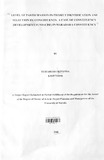| dc.description.abstract | The Constituency Development Fund (CDF) was established under the Constituencies Development Fund Act 2003. Its purpose was to take development to the citizens at the grass roots level within the shortest time possible, in order to alleviate poverty. However, the utilization and management of the fund remains a major concern. This study examined the extent to which the Fund programmes are meeting the goals set out at the beginning. The purpose of the study was to examine whether there is adequate community participation in the project selection execution, selection of CDF committees and monitoring and evaluation, while the objectives were to examine the level of awareness of the constituents about the CDF and whether they are satisfied with their involvement in the projects. The review of related literature included Historical perspectives of CDF, models of development, Symbolic interactionism theory, Fiscal policy. Decentralization, Citizen Priorities and local participation. Political economy of CDF, Monitoring and evaluation, Project management cycle, Project identification. Preparation of the project and CDF implementation process.
The study used primary and secondary data that was collected using interview guides and questionnaires. The Survey research design was employed. The design also employed Probability and Non-probability sampling and Purposive sampling for the key informants that were interviewed. The findings were used to make conclusions that can promote community awareness and participation in the projects, thus enhancing the citizens’
v
development agenda right from the grass roots level as well as promoting project ownership and good stewardship of the same by the citizens.
The study established that there was little awareness about CDF projects being implemented in Makadara constituency, where 73% of the respondents under the study indicated not being aware of CDF projects and operations in the area. The level of participation was also low as evidenced by the study findings where very few attended meeting (27%) and majority (87%) were not involved in project prioritization and identification. The constituents were also not satisfied with the operations of CDF and the way CDC officials managed the CDF projects as responded by 80% of the constituents who were under the study.
From the findings the study recommended that there should be more awareness campaigns by the government and civil society on CDF. The CDF laws should also be clear on guidelines for the participation of the civil society in CDF operations. Another recommendation wras that the CDF officials should involve all the necessary stakeholders in CDF matters in Makadara constituency.
vi | en_US |



